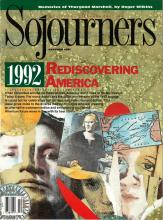We are a people on a journey—a journey from centuries of conquest, genocide, and slavery to conversion, repentance, and new history; a journey from exploitation and oppression to a time of turning, healing, reparation, and redirection. When a people are on a journey, there are two inseparable questions: Who am I? Where am I going? Identity and direction.
I struggle with answers that flow out of my distant past when African-American people experienced the whips and the chains, slave ships and auction blocks, plantations, the Ku Klux Klan, lynchings, separate but equal, bus boycotts, picket lines, and now the racism of the '90s, which continues to manifest itself East, West, North, and South while our president attacks the "politically correct" movement, states in clear terms his view that the government does not have the responsibility to provide for the human welfare of the people, and vetoes the civil rights bill.
The 500th anniversary of the arrival of Christopher Columbus in America has become the occasion to ask the question of identity and direction for all of us who have been touched and shaped by the world-changing realities that it set into motion. The world has not been the same since. The impact of Christopher Columbus' arrival on each of our histories in the particular and in the collective created a new world order defined by genocide, conquest, and slavery.
For some of us, this is a kairos moment—a moment of truth, a moment of turning, a moment of redirection and new commitments, a moment to forge covenants that will lead us from the despair of our past and present to the promise and hope of our future.
AS AN AFRICAN AMERICAN, I experience with a great deal of pain the history that was set into motion when Christopher Columbus landed in the Americas in 1492. Six years later Vasco da Gama sailed around the Cape of Good Hope in Africa. As the indigenous people in the Americas were exterminated, the invaders found themselves forced to locate an alternative labor force to continue the exploitation of the vast resources. They turned to Africa as a supply base of labor.
It was in 1518 that a Spanish ship carried the first cargo of our people from the Guinea Coast to the Americas. This opened a slave trade that was to endure for three-and-a-half centuries. The human cost is staggering. Some statistics put the total number of Africans who lost their lives during the middle passage (or before by resisting capture) at 200 million. The number of our people who reached the Americas as slaves was in the tens of millions.
Read the Full Article
